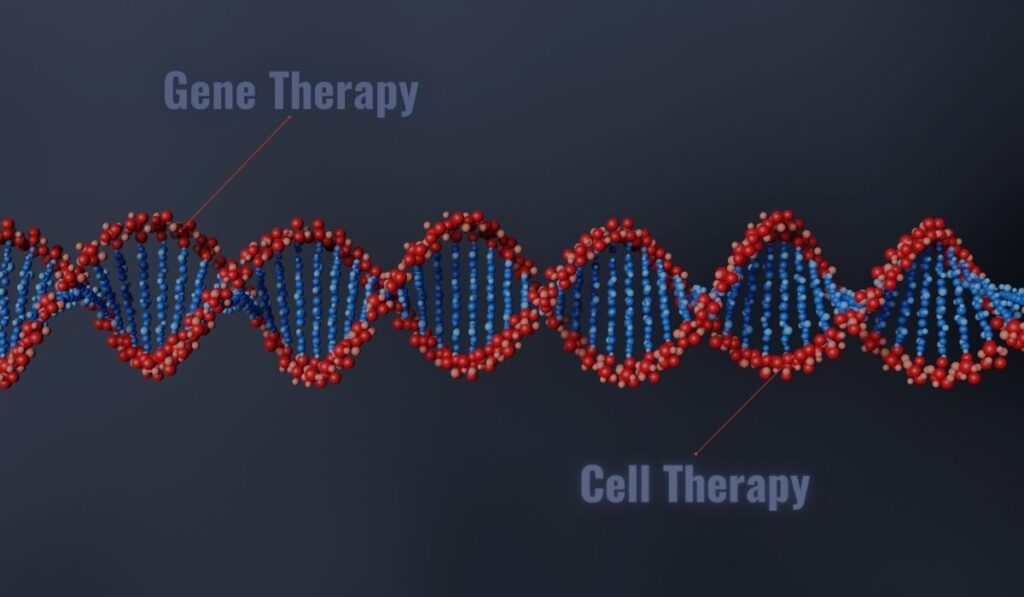POST CONTENTS
What Is Gene and Cell Therapy?
Cell Therapy
The origins of cell therapy may be traced back to trials conducted in the nineteenth century, in which researchers injected animal tissue to treat and prevent a particular disease. To provide a therapeutic effect, viable cells are injected, grafted, or implanted into a patient during cell therapy. This therapy has the potential to address a wide range of disorders, including cancer, degenerative diseases, and immunogenic pathologies, among others. During immunotherapy, the cells can be used to repair damaged tissues or to transplant T-cells that can fight cancer cells through cell-mediated immunity.

Gene Therapy
Gene therapy is a technique in which a normally functioning gene is used to treat a genetic disease by correcting replacing or regulating the damaged gene. Gene therapy can be classified into somatic cell gene therapy and germline gene therapy.
Somatic Gene Therapy: Somatic gene therapy is a technique to correct DNA damage in a somatic cell or provide an RNA molecule to treat or prevent a genetic disease. It has been used successfully to treat HIV, sickle cell anemia, transthyretin amyloidosis, and some types of cancers.
Germline Gene Therapy: In germline gene therapy, DNA is transferred into cells that produce reproductive cells, eggs, or sperm in the body. This type of treatment makes it possible to correct disease-causing gene variants that are sure to be passed down from generation to generation.
Recent Progress of Cell Therapy in India
There has been significant progress made in India on the development of cell therapy. The development of adult and embryonic stem cells, the formulation of techniques for cancer gene therapy, and the construction of gene delivery vectors are all areas of fundamental research that are being developed by a multitude of organizations around the country.
To be more particular, the first cell therapy treatment for cancer in India has been given the go-ahead from the regulatory authorities. The treatment, known as CAR-T Cell Therapy, is a form of cancer immunotherapy that makes use of T-cells, which are immune cells that have been genetically modified in a lab to improve their ability to recognize and eliminate cancer cells. With numerous groups focusing on stem cell-based therapy, India’s focus has shifted from cancer gene therapy to cell therapy. With the creation of human embryonic stem cell (HESC) lines in a few locations, India is poised to play a significant role in the developing field of HESC research.
Recent Progress of Gene Therapy in India
In this rapidly growing era of biomedical research and assessment of the burden of genetic disorders, India has become one of the few countries that have established guidelines for clinical trials of gene therapy products (GTP). In November 2019, the Indian Council of Medical Research (ICMR) in collaboration with the Department of Biotechnology (DBT) published “National Guidelines for GTP Development and Clinical Trials”.
Over the recent decade, India has achieved significant advancements in the use of gene therapy. Gene therapy has the potential to revolutionize public health by giving therapeutic choices for diseases that were previously thought to be incurable. This potential has been proved by extraordinary scientific advancements with such promise.
Through the replacement or repair of damaged genes, gene therapy represents a potentially curative area of medicine for hereditary diseases. Despite certain obstacles faced by researchers, India has demonstrated impressive growth in gene therapy research and centers, according to a review article published in the Journal of Biosciences.
Gene and cell therapy have the potential to completely transform Indian healthcare, according to a recent article in the Indian Express. According to the report, gene therapy is being investigated as a potential treatment for several illnesses, including HIV, cancer, dengue fever, and sickle cell disease. Using the same technique that the Food and Drug Administration of the United States has authorized for gene therapy, India has just made a significant advancement in its pursuit of a treatment for sickle cell disease. Using “genetic scissors,” the treatment modifies the patient’s blood stem cells, which are then given back as a single-dose infusion.
Some Questions Remain Unanswered for Gene and Cell Therapy
1. There are still a lot of questions that haven’t been solved because gene therapy is still in its development. In the present moment, there are no promises. There is currently a lack of clarity on the efficacy of gene therapy in clinical settings.
2. Concerns have been raised regarding the potential for gene therapy to have adverse consequences if it is administered to cells in the body that are not defective. The possibility that reproductive cells may be changed covertly and then passed on to an individual’s offspring is another cause for concern.
3. Some groups have ethical concerns with gene therapy. On the other hand, many are curious about who will decide which uses of gene therapy are considered “good” and “bad.” Does the use of gene therapy also have the potential to make us less tolerant of those who are different from us?
References:
- National guidelines for gene therapy product (2019): A road-map to gene therapy products development and clinical trials – PMC (nih.gov)
- Gene Therapy | Indian Council of Medical Research | Government of India (icmr.nic.in)
- ICMR issues guidelines for gene therapy in India (business-standard.com)
- Media_Report_on_National_Guidelines_for_gene_therapy_product_development_and_clinical_trials.pdf (icmr.nic.in)
- Cell Therapy in Mumbai, India – NeuroGen BSI
- ‘Genetic scissors’ — India using same tech to find sickle cell cure as gene therapy approved by US FDA (msn.com)
